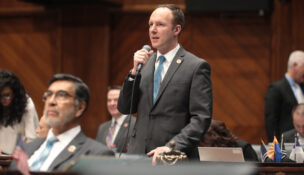Parents left to fill the gap in ESA vendor vetting
Kiera Riley Arizona Capitol Times//October 4, 2025//
Parents left to fill the gap in ESA vendor vetting
Kiera Riley Arizona Capitol Times//October 4, 2025//
Key Points:
-
State fails to cross-check ESA vendors with disciplinary records
-
Disciplined educators seem to still be listed as vendors
-
Parents left responsible for vetting providers
State law requires the Arizona Department of Education to ensure that tutors and teachers participating in the Empowerment Scholarship Account program have no past disciplinary record with the State Board of Education. However, a review of a state database of past cases and a list of ESA vendors reveals potential overlap that may be inconsistent with the statute.
Of the tutors, vendors and therapists listed by full name, seven appeared in both the state’s educator discipline database and ClassWallet, the primary ESA payment platform.
To date, the department has not completed a cross-check nor removed any vendors from ClassWallet on disciplinary grounds or otherwise.
Seven matches make up a minuscule portion of the 7,295 total registered tutors and 14,793 total vendors, and a complete picture is difficult to paint, given that there is no comprehensive roster of educators working across all private schools, tutoring businesses, and extracurricular programs.
A spokesman said the department has not received any complaints, keeps an investigator on staff to handle any concerns and is working on creating a process to check vendors.
Still, the lack of a comprehensive review, combined with a low barrier to entry and a lack of formal guidance, reveals administrative shortcomings in the ESA program’s ability to ensure only reputable vendors receive state dollars. This leaves parents as the primary line of defense in assessing whether a tutor or teacher is qualified and trustworthy.
“We are the front line, we are the principal. We are the superintendent,” Stacey Brown, an ESA mom and advocate, said. “We are checking and cross checking these people to make sure that their credentials are sufficient for our child.”
According to the ESA Parent Handbook, the department only requires tutors and tutoring businesses to submit attestations confirming a high school diploma or higher to be eligible for program dollars.
The handbook expressly states that the ESA program “does not create or maintain a list of recommended schools, vendors or educational service providers” and bestows the “sole responsibility of the account holder to ensure that an educational service provider has the proper accreditation or credentials before receiving a service.”
Beyond the accreditation requirements, the department took a hands off approach to vetting vendors until the 2024 legislative session.
As part of the fiscal year 2025 budget, lawmakers enacted a provision that restricts spending ESA dollars on tutoring or teaching services provided by an individual with a discipline record at the State Board of Education for immoral or unprofessional conduct.
The provision also requires the department to remove any person who is found to be subject to disciplinary action.
The State Board of Education handles all educator discipline for both certified and non-certified educators. But non-certified educators, as defined by state statute, only grants the board jurisdiction over current or prospective employees of districts and charters.
Complaints to the board fall into five categories — sexual offenses, assault, substance-related, fraud and theft, and breach of contract.
Disciplinary action is rare, accounting for less than 1% of valid certified educators, or approximately 1,876 people, since 2012.
Educators can surrender their certificate, or the board can impose a suspension for up to five years, revoke the license or certification, issue a letter of censure and approve or deny applications for certification.
The seven educators matched by name in both systems vary in their outcomes and offenses. The majority had substance-related offenses, while one saw enforcement related to a past string of fraud charges.
There was one negotiated settlement agreement, a voluntary surrender, a denial of an application, a revocation and two educators who had issues flagged but saw their applications approved entirely or with some conditions.
The State Board of Education keeps a database of all educators who have been subject to disciplinary action, but there is no formal guidance for ESA parents on how to do their own research, nor assurance the department had completed a check — a problem pointed out by Save Our Schools Arizona amid drafting of the ESA handbook earlier this year.
Beth Lewis and Sharon Kirsch, co-directors, and Kathy Boltz, an ESA parent and SOS Network board member, wrote: “Parents have no way of knowing if this has been done. We strongly recommend that the Arizona Department of Education create a list that parents can access or a search tool to help them ensure they are abiding by the law.”
The draft approved in June does not contain such guidance.
“The lack of attention to student safety displayed by the ADE’s omission of the above laws in the parent handbook is concerning. The safety of every student in Arizona matters,” Lewis, Kirsch and Boltz wrote.
Though the department issues no guidance, ESA parents work to share information and recommendations on education service providers online and in person.
Jenny Clark, founder of Love Your School, a school choice advocacy organization and resource for parents navigating the ESA program, noted the organization does not recommend specific vendors but facilitates a Facebook group for parents to share opinions on vendors.
“We believe parents should be the primary decision makers in what education service providers are the best for their family and meet their guidelines, including background checks, just like any other decision or industry,” Clark said in a statement.
Brown noted the same phenomenon in a number of Facebook groups, as well as through word of mouth.
“Parents are well aware of what organizations are not meeting the standard that we as parents want to see for our children, and it is very, very well known in the community, which ones of these organizations are not acceptable, and which ones we shouldn’t send our children to,” Brown said. “People genuinely respond and let other people know in the community. It comes up in conversations at homeschool co-ops and things like that.”
And in contemplating conducting more cross checks or vetting of educators by the department, Brown said she sensed parents did not want any additional restrictions.
“That’s part of the beauty of the program, is that we get to pick and choose, and we get to do our due diligence to make sure that whoever’s providing a service to our child is going to meet their needs effectively,” Brown said.














































